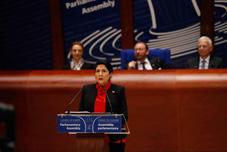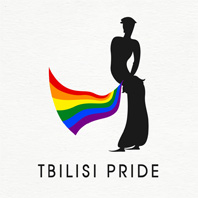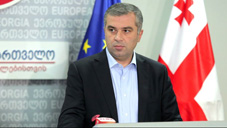
Tbilisi Pride accuses the president and foreign minister of lying
By Nika Gamtsemlidze
Thursday, January 30
Civic Movement Tbilisi Pride says that during their speeches at the session of the Parliamentary Assembly of the Council of Europe, President Salome Zourabichvili and Foreign Minister David Zalkaliani gave false information to their European counterparts about the legal situation of LGBT people in Georgia and the developments around Tbilisi Pride.
According to David Zalkaliani, despite the threats, the march of honor was held peacefully, and it was described as a merit of the government. Zourabichvili says the government is doing everything it can to protect LGBT+ rights and freedom of expression and that law enforcement has managed to handle these situations.
The foreign minister also noted that in recent years the authorities have taken numerous steps to effectively enforce anti-discrimination legislation - conducting surveys and information campaigns. At the same time, he said, public figures in government and politicians are paying close attention and condemning the attacks and violations of the freedom of expression of LGBT+ people.
The Movement reminds the President and the Minister of Foreign Affairs that the Georgian authorities have explicitly and publicly refused to protect the March of Honor in 2019.
“Whatever you want to do, we will not protect you - this was the response of the Interior Ministry in the face of the most pressing challenges that the Tbilisi Pride organizers and community members were facing in terms of security,” reads the statement of Tbilisi Pride.
According to Tbilisi Pride, “the state did nothing to deter open threats and violence by hate groups in Tbilisi and used extremely undemocratic methods against them.”
The statement reads that the Georgian authorities have so far not recognized homophobia as a social problem and circulated lies locally or internationally.
Addressing the Parliamentary Assembly of the Council of Europe (PACE), President of Georgia Salome Zourabichvili said that public attitudes towards the LGBT community are based on religious traditions and Soviet Puritanism.
She also talked about free speech in Georgia and noted that ‘it has no limits.’
President also talked about the occupation and noted that every tool needs to be used so that this issue can be seen and discussed widely in European society.
Talking about the freedom of Media, Zourabichvili noted that even after the change of the leadership, Rustavi 2 has remained to be a strong opposition channel.
“Today all media outlets enjoy full freedom. No media outlet has been fined or constrained by public or judicial decisions of any kind,” noted Zourabichvili.
According to Zourabichvili, Georgia is going to the occasion to go over and bypass its national legislation, which prevents people that have been visiting the occupied territories without Georgian authorization and without entering through Georgian territory, prevents them from re-entering the territory of Georgia. This would preclude many members of the Russian delegation to enter.
But, as Zourabichvili said, “unlike what has been declared policy by the Russian President lately, we are a country that respects its international commitments, all of them, we are going to respect our international commitments and receive the Parliamentary Assembly as we are dictated by the rules and regulations of the Parliamentary Assembly.”
Former Parliament Speaker and majority member Irakli Kobakhidze said that President’s speech deserves 'highest praise.' According to him, the President spoke about the occupation 'in great detail.'
Davit Bakradze, one of the leaders of European Georgia, responded to Salome Zourabichvili's speech and said that the president "exceeded expectations". According to Bakradze, Zurabishvili spoke "lies" from an international tribune.
“Zourabichvili lied about freedom of the media, justice system, electoral environment, and protected minorities. There were the toughest questions and we heard weak and groundless answers,” noted Bakradze.
Georgian presidency of the CoE Committee of Ministers was announced a few months ago. The Presidency of the Committee of Ministers is held for a six-month term in turn by the representatives of the members in English alphabetical order. The Presidency is transferred to a new President in mid-May and mid-November, at a date fixed by the Committee based on a joint proposal by the incoming and outgoing Presidents.



